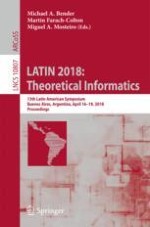2018 | OriginalPaper | Buchkapitel
Approximate Correlation Clustering Using Same-Cluster Queries
verfasst von : Nir Ailon, Anup Bhattacharya, Ragesh Jaiswal
Erschienen in: LATIN 2018: Theoretical Informatics
Aktivieren Sie unsere intelligente Suche, um passende Fachinhalte oder Patente zu finden.
Wählen Sie Textabschnitte aus um mit Künstlicher Intelligenz passenden Patente zu finden. powered by
Markieren Sie Textabschnitte, um KI-gestützt weitere passende Inhalte zu finden. powered by
